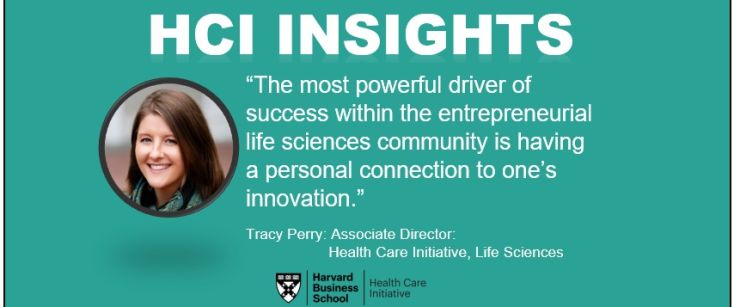If you have an interest in life sciences and you’re intrigued by the idea of being an entrepreneur, now is an excellent time to consider taking that leap. In the past two years, we have seen extraordinary examples of how companies quickly pivoted operations, strategy, and tactics to literally save lives. However, there is so much more to be done— not just on the COVID front, but also in scientific research and technology development across all disease states. Now, more than ever, the world needs leaders who are at the intersection of science and business and who have the ability and the passion to solve today’s most pressing health care problems.
As the associate director of the Health Care Initiative focusing on life sciences, I’ve managed the Blavatnik Fellowship since 2013 and have had the privilege of seeing extraordinary innovators work on some of the world’s toughest health care challenges. Many people have asked me what it is about the life sciences that seems to attract HBS entrepreneurs. Based on my experience, the most powerful driver to this community is having a personal connection to one’s innovation.
Some of the Fellows have shared how they witnessed the effects of poor delivery of care, a frustrating gap in medical technology, or an inefficiency somewhere in the continuum of medicine that needed to be improved. We can all certainly relate to that sense of helplessness when seeing a loved one suffer. These Fellows took that notion of helplessness and turned it into a personal mission to make a difference – which is, of course, the HBS mission: “to educate leaders who make a difference in the world.”
As such, some of our entrepreneurs have devoted their Fellowship year to making advancements in cancer, neurodegenerative diseases, women’s health, rare childhood disorders, genetic diseases, mental health, better devices and diagnostics, and more. I believe it’s their personal connection to their respective innovations that allows them to persevere through inevitable start-up setbacks, endure the long hours required to move an idea forward, and even reflect on their own strengths and areas for improvement. From my vantage point, it’s that keen sense of self-awareness that is the hallmark of some of the most engaging entrepreneurs.
Choosing an entrepreneurial path can feel a bit risky. Alumni may need to leave a long-term career post; ECs may have to pass on a job offer; and MD/MBAs may have to take a sabbatical from their practice. While the decision to be an entrepreneur is not simple, the Blavatnik Fellowship provides some buffers to help entrepreneurs get started. These resources include a salary and benefits, mentorship from key business and science leaders, and support from a community of entrepreneurs ready to share advice.
If you think you’ve got the passion and drive to launch an innovation, then I encourage you to consider spending a year with the Blavatnik Fellowship in Life Science Entrepreneurship.







